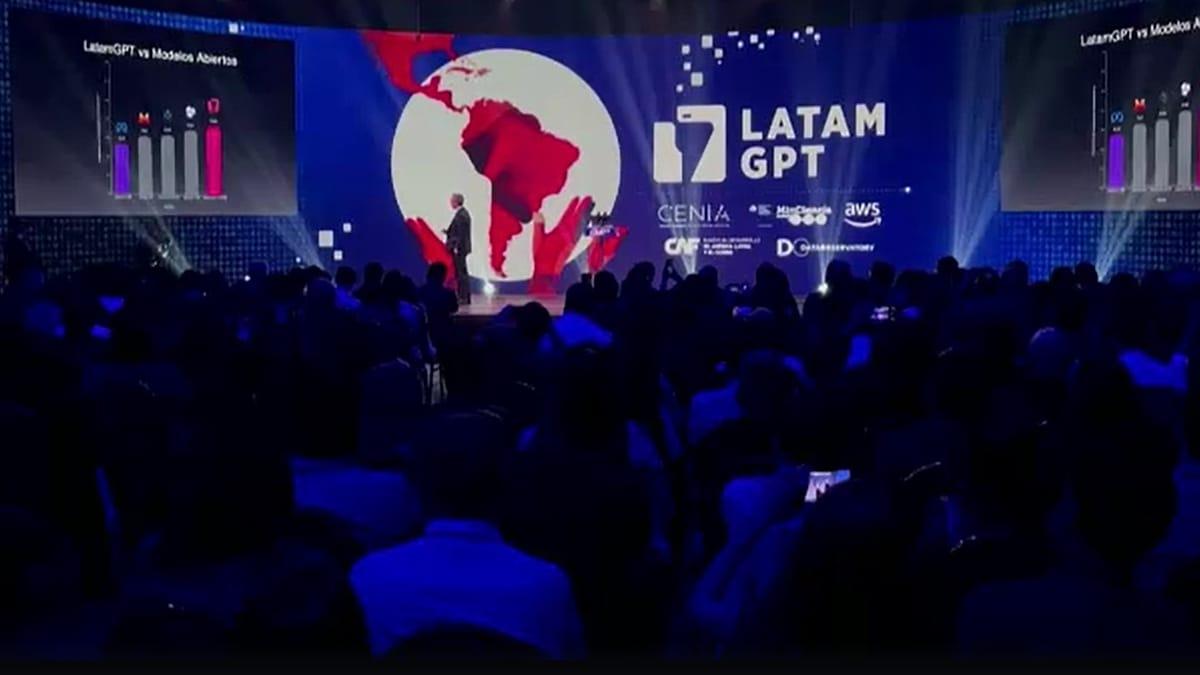Latin American Countries Unite to Launch Latam-GPT: A Culturally Tailored AI Model
3 Sources
3 Sources
[1]
Latin American countries to launch own AI model in September
SANTIAGO, June 17 (Reuters) - A dozen Latin American countries are collaborating to launch Latam-GPT in September, the first large artificial intelligence language model trained to understand the region's diverse cultures and linguistic nuances, Chilean officials said on Tuesday. This open-source project, steered by Chile's state-run National Center for Artificial Intelligence (CENIA) alongside over 30 regional institutions, seeks to significantly increase the uptake and accessibility of AI across Latin America. Chilean Science Minister Aisen Etcheverry said the project "could be a democratizing element for AI," envisioning its application in schools and hospitals with a model that reflects the local culture and language. Developed starting in January 2023, Latam-GPT seeks to overcome inaccuracies and performance limitations of global AI models predominantly trained on English. Officials said that it was meant to be the core technology for developing applications like chatbots, not a direct competitor to consumer products like ChatGPT. A key goal is preserving Indigenous languages, with an initial translator already developed for Rapa Nui, Easter Island's native language. The project plans to extend this to other Indigenous languages for applications like virtual public service assistants and personalized education systems. The model is based on Llama 3 AI technology and is trained using a regional network of computers, including facilities at Chile's University of Tarapaca and cloud-based systems. Regional development bank CAF and Amazon Web Services have supported it. While currently lacking a dedicated budget, CENIA head Alvaro Soto hopes that demonstrating the system's capabilities will attract more funding. Reporting by Fabian Cambero; Editing by Lisa Shumaker Our Standards: The Thomson Reuters Trust Principles., opens new tab Suggested Topics:Artificial Intelligence
[2]
Latin American Countries to Launch Own AI Model in September
SANTIAGO (Reuters) -A dozen Latin American countries are collaborating to launch Latam-GPT in September, the first large artificial intelligence language model trained to understand the region's diverse cultures and linguistic nuances, Chilean officials said on Tuesday. This open-source project, steered by Chile's state-run National Center for Artificial Intelligence (CENIA) alongside over 30 regional institutions, seeks to significantly increase the uptake and accessibility of AI across Latin America. Chilean Science Minister Aisen Etcheverry said the project "could be a democratizing element for AI," envisioning its application in schools and hospitals with a model that reflects the local culture and language. Developed starting in January 2023, Latam-GPT seeks to overcome inaccuracies and performance limitations of global AI models predominantly trained on English. Officials said that it was meant to be the core technology for developing applications like chatbots, not a direct competitor to consumer products like ChatGPT. A key goal is preserving Indigenous languages, with an initial translator already developed for Rapa Nui, Easter Island's native language. The project plans to extend this to other Indigenous languages for applications like virtual public service assistants and personalized education systems. The model is based on Llama 3 AI technology and is trained using a regional network of computers, including facilities at Chile's University of Tarapaca and cloud-based systems. Regional development bank CAF and Amazon Web Services have supported it. While currently lacking a dedicated budget, CENIA head Alvaro Soto hopes that demonstrating the system's capabilities will attract more funding. (Reporting by Fabian Cambero; Editing by Lisa Shumaker)
[3]
Latin American countries to launch own AI model in September
Chilean Science Minister Aisen Etcheverry said the project "could be a democratizing element for AI," envisioning its application in schools and hospitals with a model that reflects the local culture and language. Developed starting in January 2023, Latam-GPT seeks to overcome inaccuracies and performance limitations of global AI models predominantly trained on English.A dozen Latin American countries are collaborating to launch Latam-GPT in September, the first large artificial intelligence language model trained to understand the region's diverse cultures and linguistic nuances, Chilean officials said on Tuesday. This open-source project, steered by Chile's state-run National Center for Artificial Intelligence (CENIA) alongside over 30 regional institutions, seeks to significantly increase the uptake and accessibility of AI across Latin America. Chilean Science Minister Aisen Etcheverry said the project "could be a democratizing element for AI," envisioning its application in schools and hospitals with a model that reflects the local culture and language. Developed starting in January 2023, Latam-GPT seeks to overcome inaccuracies and performance limitations of global AI models predominantly trained on English. Officials said that it was meant to be the core technology for developing applications like chatbots, not a direct competitor to consumer products like ChatGPT. A key goal is preserving Indigenous languages, with an initial translator already developed for Rapa Nui, Easter Island's native language. The project plans to extend this to other Indigenous languages for applications like virtual public service assistants and personalized education systems. The model is based on Llama 3 AI technology and is trained using a regional network of computers, including facilities at Chile's University of Tarapaca and cloud-based systems. Regional development bank CAF and Amazon Web Services have supported it. While currently lacking a dedicated budget, CENIA head Alvaro Soto hopes that demonstrating the system's capabilities will attract more funding.
Share
Share
Copy Link
A dozen Latin American countries are collaborating to launch Latam-GPT, an AI language model designed to understand the region's diverse cultures and languages, set to debut in September.
Latin American Countries Collaborate on Groundbreaking AI Project
In a significant move towards technological autonomy, a dozen Latin American countries are joining forces to launch Latam-GPT, the region's first large-scale artificial intelligence language model. Set to debut in September, this innovative project aims to understand and reflect the diverse cultures and linguistic nuances of Latin America
1
.
Source: ET
A Collaborative Effort for Regional AI Development
The open-source project is spearheaded by Chile's state-run National Center for Artificial Intelligence (CENIA), in collaboration with over 30 regional institutions. This collective effort seeks to significantly boost the adoption and accessibility of AI across Latin America
2
.Overcoming Language Barriers and Cultural Inaccuracies
Latam-GPT, which began development in January 2023, aims to address the limitations of global AI models that are predominantly trained on English-language data. By focusing on local languages and cultural contexts, the project seeks to enhance accuracy and performance for Latin American users
3
.Technological Foundation and Support
The model is built upon Llama 3 AI technology and utilizes a regional network of computers for training, including facilities at Chile's University of Tarapaca and cloud-based systems. The project has garnered support from the regional development bank CAF and Amazon Web Services, highlighting its potential impact and importance
1
.Preserving Indigenous Languages and Enhancing Public Services

Source: Reuters
A key objective of Latam-GPT is the preservation and promotion of Indigenous languages. The project has already developed an initial translator for Rapa Nui, the native language of Easter Island. Plans are in place to extend this capability to other Indigenous languages, with potential applications including virtual public service assistants and personalized education systems
2
.Related Stories
Democratizing AI Access and Applications
Chilean Science Minister Aisen Etcheverry envisions Latam-GPT as a "democratizing element for AI," with potential applications in schools and hospitals. The model is designed to serve as core technology for developing various applications, such as chatbots, rather than competing directly with consumer products like ChatGPT
3
.Future Prospects and Funding Challenges
While the project currently lacks a dedicated budget, CENIA head Alvaro Soto is optimistic that demonstrating the system's capabilities will attract additional funding. The successful launch and implementation of Latam-GPT could potentially reshape the AI landscape in Latin America, offering tailored solutions for the region's unique linguistic and cultural needs
1
.References
Summarized by
Navi
Related Stories
Chile unveils Latam-GPT, an open-source AI model built to combat bias in Latin America
10 Feb 2026•Technology

Global South Leads in Developing Culturally Relevant AI Models
21 May 2025•Technology

African Next Voices: Bridging the AI Language Gap with Massive African Dataset
19 Oct 2025•Science and Research

Recent Highlights
1
OpenAI secures $110 billion funding round from Amazon, Nvidia, and SoftBank at $730B valuation
Business and Economy

2
Anthropic stands firm against Pentagon's demand for unrestricted military AI access
Policy and Regulation

3
Pentagon Clashes With AI Firms Over Autonomous Weapons and Mass Surveillance Red Lines
Policy and Regulation





